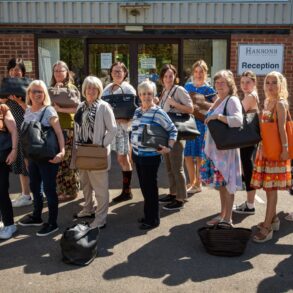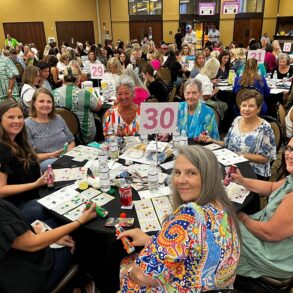One year ago, a secret recording of three Los Angeles City Council members conspiring with a prominent labor leader about how council district boundaries should be redrawn was anonymously leaked to the public, upending business at City Hall.
The audio – which was also laced with racist and derogatory comments – was met with swift calls from the public and elected officials, including President Joe Biden, for those involved to immediately step down from their posts. This included then-councilmembers Nury Martinez and Gil Cedillo, current Councilmember Kevin de León and then-labor leader Ron Herrera, all of whom have since apologized for taking part in that conversation.
The City Council censured their colleagues – the first time in at least a century that the council had censured one of its own members – and two of the councilmembers in question were stripped of committee assignments in an attempt to pressure them to resign.
For the next several weeks, the City Council struggled to get through meetings, so chaotic was the scene inside the council chamber. At times, officers in riot gear were called in, as angry protesters shouted over elected officials and vowed to “shut down” meetings until every councilmember heard on that tape resigned.
Martinez was the first of the elected officials to heed those calls. She resigned as council president one day after news broke about the audio. Two days later, she resigned from the council altogether.
The other two councilmembers involved refused to resign. Cedillo eventually left office in December when his term was up. The other, de León, remains on the council and recently announced plans to run for reelection.
Beyond calls for the councilmembers to resign, the scandal spurred discussions about the need for government reforms. Today, city officials are considering increasing the number of council seats to improve voter representation and having an independent redistricting commission draw future City Council maps to keep councilmembers from meddling in the process.
Monday, Oct. 9, marks the anniversary of when news broke about that secret recording. One year later, we take stock of what’s happened to some of the central figures in that scandal and where things stand today in terms of potential reforms.
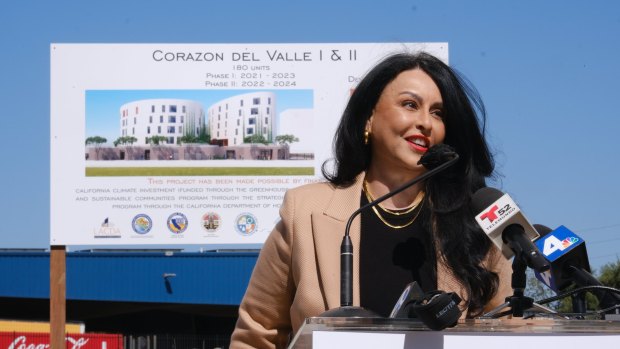
Nury Martinez
For many Angelenos who listened to the audio, Martinez’s comments were considered the most offensive during that October 2021 backroom meeting at the office of the L.A. County Federation of Labor, where Herrera served as president at the time.
In the recording, Martinez compared then-fellow Councilmember Mike Bonin’s young Black son to a “changuito” (Spanish for “little monkey”) and suggested that Bonin, who is White, lugged the child around like an “accessory.”
Elsewhere in the conversation, Martinez referred to Oaxacans as “little short dark people.”
Before the scandal, Martinez – who had also served on the San Fernando City Council and Los Angeles Unified school board – was seen as a rising star in L.A. politics, becoming the first Latina to serve as L.A. City Council president.
But since resigning from the L.A. City Council, Martinez has virtually disappeared from the public eye. She only recently broke her silence, granting her first interview since her resignation last fall to LAist for a four-part podcast about that secretly recorded conversation.
Martinez told LAist Studios host Antonia Cereijido during last week’s episode of “Imperfect Paradise” that she’s thought about that day “a thousand times, if not more.”
“And I also think of the people who are just never gonna accept my apology,” Martinez said, “who really haven’t and will probably never forgive me. And so for that, I carry a lot of … shame and guilt.”
Requests for an interview were left on Martinez’s last known phone numbers and with an acquaintance. None of those messages were returned.
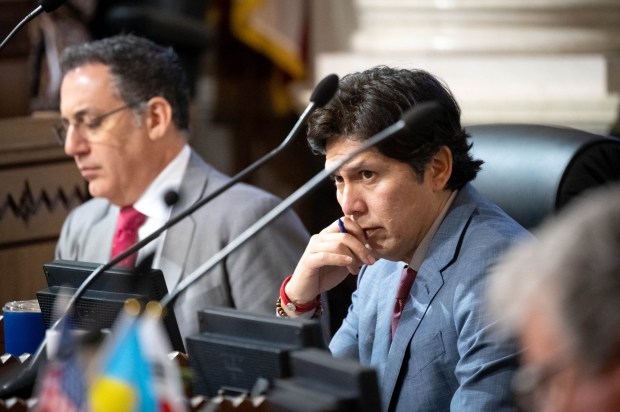
Kevin de León
Not only has de León resisted calls to resign; the councilmember is seeking reelection in next year’s District 14 council race.
Just last week, his campaign announced that de León had raised $118,000 in 10 days in his bid for another council term.
At the same time, members of the public continue to call on de León to resign at each council meeting.
De León’s office declined multiple requests to make the councilmember available for an interview for this article.
In the recorded conversation, when Martinez said Bonin used his son as an “accessory,” de León chimed in with, “Just like when Nury brings her Goyard bag or the Louis Vuitton bag.”
De León later told news outlets his remark was not an attack on Bonin’s family but intended as a joke about Martinez’s “penchant for having luxury handbags.”
He apologized for his “flippant” remark and said he should have spoken up when Martinez uttered her offensive comments. He also said he would not resign but wished to be a part of the healing process.
In the meantime, de León has felt the public’s wrath the past 12 months.
In the early days of the scandal, some councilmembers walked out of meetings when he appeared in the council chamber. Protesters camped out outside his Eagle Rock home, demanding his resignation.
And in mid-December, his first appearance at a council meeting in two months led to more havoc in the council chamber. That evening, de León ended up in a skirmish with a community organizer and frequent critic during a toy giveaway event in his district. Both men filed battery reports with the police against the other person, but the City Attorney’s Office declined to file charges.
The following week, during the council’s last meeting before recessing for the holidays, de León’s presence at the meeting once more led to chaos, as protesters screamed profanities while supporters of de León began clapping and chanting his name.
While meetings have quieted down significantly since, members of the public continue to call for his resignation while de León has insisted that he’s focused on serving the people of his district.
“My constituents deserve this high level of dedicated public service and I’m grateful for their ongoing trust and support,” he said last month in announcing that he would seek another term in office. “At the end of the day, the heart and soul of the work that we do as council members is about serving the people, especially those that are struggling.”
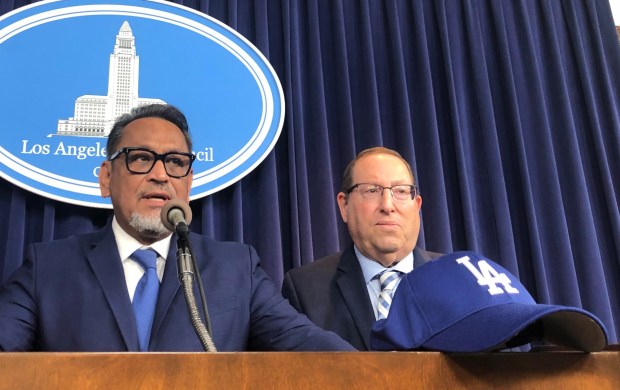
The others in the room
Like Martinez, former Councilmember Cedillo and Herrera, the former union head, have kept low profiles since the audio leak.
Attempts to reach both men for interviews were unsuccessful.
Cedillo, who had also previously served in the state Assembly, left office at the end of his City Council term in December. The day after, he issued a lengthy statement, defending his track record and insisting that he and the three others heard in the private meeting were “doing our jobs” by discussing redistricting and fair representation for “Latinos and all communities.”
“I publicly apologized for not cutting off my colleagues when their comments crossed a line. But to resign for staying silent, with no look at who said what in that room, and ignoring the totality of my work and history? That is unacceptable,” Cedillo said in his statement.
He went on to say he refused to resign because ““I did nothing that warranted it. My life’s work has been about fighting relentlessly for those who do not have a voice – regardless of their ethnic background.”
In the leaked audio, group members at one point discussed how many Oaxacans live in Koreatown.
“Puro Oaxacan Koreans,” said Cedillo. “Not even like Kevin, little ones.”
Herrera then referred to Oaxacans as Indians: “Indios. My mom used to call them indios,” he said.
Herrera stepped down as president of the L.A. County Federation of Labor the day after the audio leak.
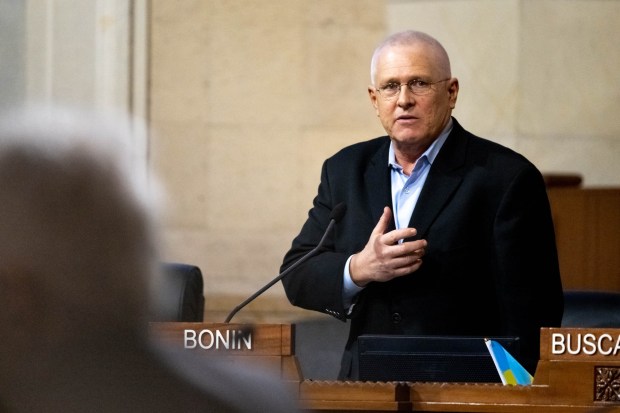
Mike Bonin
After nearly a decade on the City Council, Bonin left office at the end of 2022 when his term ended. He continues to host the “What’s Next, Los Angeles?” podcast, which focuses on politics and public affairs, and is currently completing a “Leadership in Government” fellowship with the Open Society Foundations.
One year out from when he first learned of the secret recording, Bonin, in an interview last week, said he’s as angry as the day he first heard the vile comments on the tape.
“I don’t think (Martinez’s) whole life should be captured by this time, but I’m still (expletive) angry. I have not gotten to a place of forgiveness,” he said, adding that the comments about his son were made by an elected official who ran on a platform of supporting children and family.
The idea that his son was attacked by “a couple of the most powerful people in Los Angeles” caused “a deep wound,” Bonin said.
Bonin said his son, now 9, has a general awareness of the tape but is still too young to fully comprehend what was said. Bonin said it’s not up to him to forgive, on behalf of his son, the individuals heard on the tape.
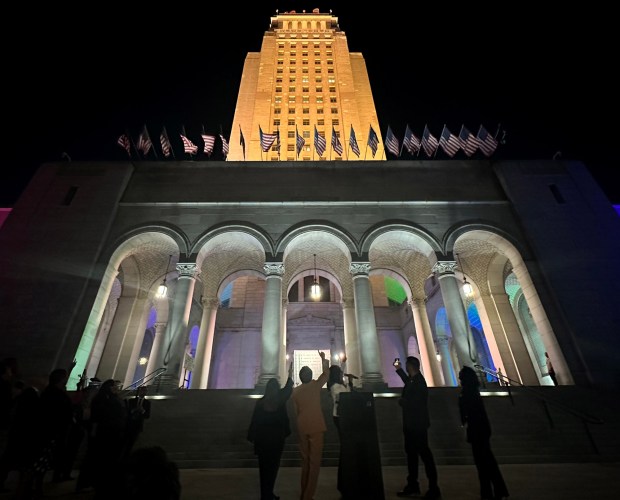
Redistricting reforms
Last November, about a month after the bombshell revelation about the secret recording, new council President Paul Krekorian formed an ad hoc committee to focus on city governance reforms.
Last week, following months of meeting, the committee forwarded a set of recommendations to the City Council to switch to an independent redistricting commission for redrawing council district boundaries.
Ultimately, it will be up to voters whether to switch to an independent redistricting process. But the council must first decide what an independent commission would look like and how it would operate so that a proposal can be placed on the November 2024 ballot.
An independent commission would be a dramatic departure from the city’s current redistricting process, in which councilmembers get to appoint commissioners and have final say in how the maps are drawn. The current system enables councilmembers to determine their own district boundaries and is what led to the backroom meeting between Martinez, de León, Cedillo and Herrera.
But even before the audio leak renewed calls for an independent redistricting commission, City Councilmembers Nithya Raman and Paul Krekorian called for an independent commission shortly after the last redistricting effort in 2021. Both councilmembers were in danger of losing a significant chunk of the constituents who initially voted them into office based on various versions of council maps that the commission considered. In the end, Raman lost about 40% of her initial constituents.
In the secretly recorded audio, group members said Raman wasn’t a political ally whose district was worth saving. “So you’re saying that’s the one to put in the blender and chop up, left and right,” de León said.
During a recent interview, Raman said hearing the tape affirmed what she and her staff had suspected all along – “that our district was being targeted.”
“It was awful to hear the truth put so plainly, but it did not come as a surprise to me and my team who went through the process,” said Raman.
Beyond what happened to her in terms of redistricting, Raman said she was shocked and horrified by “the extent of open racism and homophobia” heard on the tape.
“Working with the former council president was never easy, but this was beyond anything that I had encountered in my interactions with her,” Raman said about Martinez. “It was horrifying that … these were people that were in leadership in the city.”
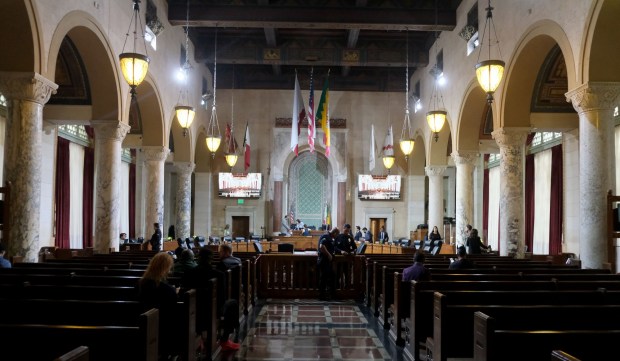
Council expansion
In addition to redistricting reforms, elected officials are talking about increasing the number of council seats to improve voter representation while decreasing the power of each individual councilmember. But the governance reform committee has yet to put forward any recommendation about the number of districts the council should have.
Despite seeing its population roughly quadruple over the past century, the L.A. City Council has remained at 15 districts – the same number that existed in 1925. Today, with just under 4 million residents, each council district represents nearly 265,000 Angelenos.
By comparison, New York City has 51 councilmembers, who each represent fewer than 173,000 people on average, and Chicago has 50 councilmembers who represent about 55,000 people each.
But increasing the number of councilmembers too much could also change the power dynamics in L.A. and result in the mayor having more power – a concern raised by not only councilmembers but academics and good governance experts.
The last time the city asked voters to approve increasing the number of council districts in L.A. – in order to lower the number of residents each councilmember represents to a more manageable size – Angelenos voted down the idea.
“Time will tell if there is more appetite among the public (today), but I think the general idea of having smaller council districts is what a lot of people find appealing because they understand that will make grassroots engagement in the democratic process more impactful,” said Krekorian, the current council president. “And councilmembers will be closer to voters and more engaged with voters.”
Raphael Sonenshein, of the Haynes Foundation, was executive director of the Los Angeles Appointed Charter Reform Commission in 1999, helping to lead the first comprehensive revision of the city’s charter in about 75 years.
Although voters in 1999 rejected an effort to increase the number of council seats in L.A., there was interest even then for reform, Sonenshein said. Today’s electorate is younger and more diverse than the electorate of the late 1990s, when voters tended to be older and more wary of too many politicians, Sonenshein said. He believes voters today may be more willing to increase the council size.
In recent years, a string of corruption cases and political scandals at City Hall have eroded the public’s trust in their local government. But Sonenshein said he’s optimistic the reform measures the City Council is currently considering could lead to positive changes.
“Good reform can really help make things better,” Sonenshein said. “They’re not a solution by itself. But they’re steps you can build on.”
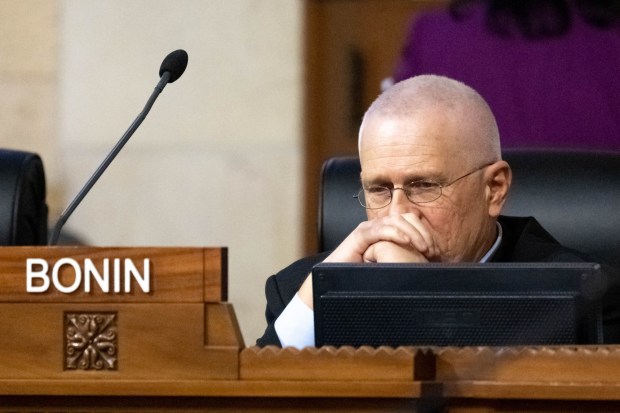
Moving on
Bonin said that in the immediate aftermath of the audio leak, Martinez called his cellphone but did not leave a message.
De León left a voicemail message, apologizing, but Bonin said he did not find it to be sincere. Cedillo texted Bonin a copy of a statement he had made to the public and attempted to speak with Bonin at the next council meeting but was prevented from doing so by Bonin’s staff. He never heard from Herrera, Bonin said.
He said he’d have to think about whether he would take a call from any of those four individuals if they were to reach out to him today.
As for the rest of Los Angeles, Bonin said until de León is out of office, it’s difficult for Angelenos to move beyond this scandal.
“It’s been impossible to heal while de León has been on the council,” Bonin said. “I think it would’ve facilitated healing (citywide) if he had resigned.”
In the meantime, the City Council is moving forward with discussions on reform.
Raman, who serves on the council’s governance reform committee, is aware that naysayers may be skeptical that the work the reform committee is doing will actually help clean up City Hall.
But she believes it’s possible, citing recent reforms she said has had a notable impact on local elections. This includes the city changing its election cycle to coincide with federal elections in order to increase voter turnout, plus changes to a matching fund program for city candidates to help level the playing field with other candidates with deeper pockets, Raman said.
“I think about some of the reforms that came in a few years ago, some of which have pushed us in a different direction, and they have had real impact,” she said. “I wouldn’t be advocating for change if I didn’t think that change would have impact.”
This post was originally published on this site be sure to check out more of their content.






